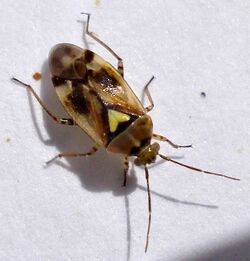Biology:Orthops basalis
From HandWiki
Short description: Species of true bug
| Orthops basalis | |
|---|---|

| |
| Scientific classification | |
| Domain: | Eukaryota |
| Kingdom: | Animalia |
| Phylum: | Arthropoda |
| Class: | Insecta |
| Order: | Hemiptera |
| Suborder: | Heteroptera |
| Family: | Miridae |
| Genus: | Orthops |
| Species: | O. basalis
|
| Binomial name | |
| Orthops basalis (A. Costa, 1853)
| |
| Synonyms | |
| |
Orthops basalis is a species of plant bug belonging to the family Miridae, subfamily Mirinae that can be found everywhere in Europe except for Azores, Bosnia and Herzegovina Faroe Islands, Iceland and Cyprus.[1][2] then east across the Palearctic to Central Asia and Siberia.
Description
It is 5 millimetres (0.20 in) long and is elongated with males often having three pale spots on the scutellum.[3]
Biology
Orthops basalis lives on various Apiaceae and have no specialization in certain genera. Both the nymphs and the adult bugs are often on the flowers, especially on the stems directly below the flowers. There they suck on the immature reproductive organs. [4]
References
- ↑ "Orthops (Orthops) basalis (A. Costa, 1853)". Fauna Europaea. August 29, 2013. http://www.faunaeur.org/full_results.php?id=452077. Retrieved October 14, 2013.
- ↑ Kerzhner I. M.; Josifov M. (1999). "Family Miridae". in Aukema, Berend. Catalogue of the Heteroptera of the Palaearctic Region. 3, Cimicomorpha II. Amsterdam: Netherlands Entomological Society. pp. 1–577, page 132. ISBN 978-90-71912-19-1.
- ↑ "Orthops basalis". British Bugs. http://www.britishbugs.org.uk/heteroptera/Miridae/orthops_basalis.html. Retrieved June 23, 2013.
- ↑ Ekkehard Wachmann, Albert Melber, Jürgen Deckert: Wanzen. Band 2: Cimicomorpha: Microphysidae (Flechtenwanzen), Miridae (Weichwanzen) (= Die Tierwelt Deutschlands und der angrenzenden Meeresteile nach ihren Merkmalen und nach ihrer Lebensweise. 75. Teil). Goecke & Evers, Keltern 2006, ISBN:3-931374-57-2, S. 96.
External links
Wikidata ☰ Q10612458 entry
 |

